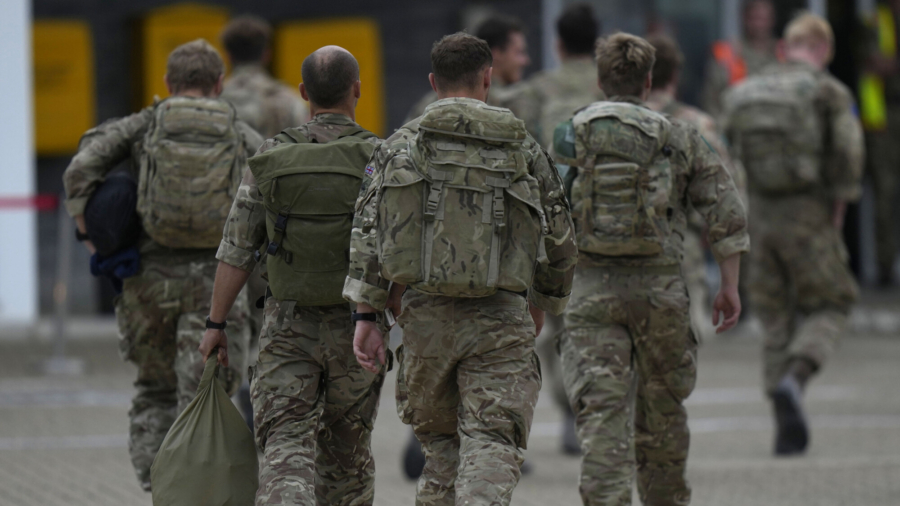British Army Chief of the General Staff Gen. Patrick Sanders has said that U.K. civilians should be ready to fight in a hypothetical land war with Russia.
The general’s comments came on Jan. 24, when he stated that the British military is currently undermanned and not equipped to deal with emerging threats in a changing world.
The general cautioned that Russia’s invasion of Ukraine was a primary example of the difference citizen armies could make in conflicts.
“Ukraine brutally illustrates that regular armies start wars; citizen armies win them,” Sanders said in a speech at an International Armored Vehicles conference near London, according to the BBC.
“Taking preparatory steps to enable placing our societies on a war footing when needed are now not merely desirable but essential,” Sanders continued.
He went on to say that other European nations, and especially those located closer to Russia, are already in preparation for a potential escalation.
“Our friends in eastern and northern Europe, who feel the proximity of the Russian threat more acutely, are already acting prudently, laying the foundations for national mobilization,” he said.
Currently, the British Army is comprised of around 75,000 fully trained professional infantry, down from around 100,000 in 2010, in addition to approximately 63,000 service members in the Royal Navy and the Royal Air Force, according to estimates.
Gen. Sanders has long been pushing for additional military spending. At present, the U.K.’s military budget is around 2 percent of its gross domestic product. Despite promises by the British government to increase this to 2.5 percent, Gen. Sanders argued this was still insufficient.
In his view, the British Army should boast a minimum of 120,000 soldiers by 2027, a figure which he says is still not enough.
According to Gen. Sanders, the army has halved in size over the past three decades, and has seen an almost 30 percent reduction since 2012. Despite this, he said, recruitment applications are now at their highest since 2017.
Sanders’ concerns were echoed by other U.K. officials, who voiced concerns over growing international threats.
British Defense Secretary Grant Shapps stated earlier this month that Britain needs to adapt to the transition “from a post-war to pre-war world.”
“Old enemies are reanimated. New foes are taking shape. Battle lines are being redrawn. The tanks are literally on Europe’s Ukrainian lawn,” said Mr. Shapps.
“The foundations of the world order are being shaken to their core. We stand at this crossroads—whether to surrender to a sea of troubles, or do everything we can to deter the danger. I believe that, in reality, it’s no choice at all. To guarantee our freedoms, we must be prepared,” he said in a recent speech.
British Prime Minister Rishi Sunak responded to the remarks via his office in Downing Street, saying that he rules out any military conscription.
Meanwhile, an extensive military exercise was launched by the U.S. and its NATO allies this week.
Steadfast Defender 2024 will see the most elaborate military drills by the alliance since the end of the Cold War. It will include the participation of around 90,000 allied troops in a rehearsal of NATO’s first regional defense plans in decades.
“I’m not saying it is going wrong tomorrow. But we have to realize it’s not a given that we are in peace, and that’s why we have the plans,” Dutch Adm. Rob Bauer, the NATO military committee chief, said at a press conference ahead of the exercises.
Adm. Bauer added that Ukraine is a primary example of an entire country’s population participating in a conflict.
“It is the whole of society that will get involved, whether we like it or not,” he said.
Bauer went on to say that NATO member states must subsequently adapt to the unprecedented changes, which come at a time where anything can happen. He further urged citizens to prepare basic supplies, and to expect the unexpected.
However, there may be deeper reasons surrounding the difficulties facing recruitment. While there has been an increase in applications in recent years, recruitment targets are consistently not being met.
This could be the result of efforts to recruit more “non-white people” and women into the military, according to an article by The Telegraph earlier this month.
Quite often these attempts achieve the opposite result, as the focus is merely on quotas at the expense of recruit suitability.
One example of this was the 2022 Royal Air Force recruitment fiasco, where it emerged that female and ethnic minority candidates were prioritized over white male recruits—regardless of whether they were more suitable or not.


